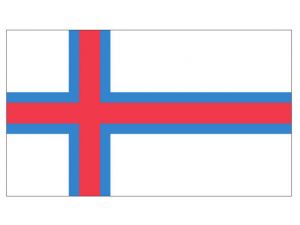Language/Faroese/Grammar/Adjectives
Hi Faroese learners! 😊
In this lesson, we will learn about adjectives in Faroese grammar. We will cover the basics of adjective syntax, adjective declination, and comparative and superlative forms. I hope you're ready to dive in!
Don't hesitate to look into these other pages after completing this lesson: Questions, Pronouns, Negation & Conditional Mood.
Adjective syntax[edit | edit source]
In Faroese, adjectives are used to describe a noun (a person, place, or thing). They usually come before the noun they describe. Let's take a look at some examples:
| Faroese | Pronunciation | English |
|---|---|---|
| ein gamal maður | ayn gamal maahdur | an old man |
| ein bláur bil | ayn blah-ur bil | a blue car |
| eitt stórt hús | eyt stohrt hus | a big house |
| ein lítill hundur | ayn lee-till hunn-dur | a small dog |
As you can see, the adjective agrees in gender, number, and case with the noun it describes. We will cover this in more detail in the next section.
Adjective declination[edit | edit source]
In Faroese, adjectives decline according to the gender, number, and case of the noun they describe. There are three genders in Faroese: masculine, feminine, and neuter. Here are examples of adjective declination for each gender:
Masculine[edit | edit source]
| Faroese | Pronunciation | English |
|---|---|---|
| ein gamal maður | ayn gamal maahdur | an old man |
| tann góði vinurin | tahn goh-thee vin-ur-in | the good friend (masculine) |
| havi ein raudan bíl | hav-ee ayn rau-dan beel | have a red car (masculine) |
Feminine[edit | edit source]
| Faroese | Pronunciation | English |
|---|---|---|
| eina góða móðir | ey-nah goh-thah mo-thir | a good mother |
| tann stóra bókin | tahn stoh-ra boh-kin | the big book (feminine) |
| havi ein tjóðliga fest | hav-ee ayn tyoh-th-lee-gah fest | have a national festival (feminine) |
Neuter[edit | edit source]
| Faroese | Pronunciation | English |
|---|---|---|
| eitt gott hús | ey-t goht hus | a good house (neuter) |
| tann stóra borðið | tahn stoh-ra bor-thid | the big table (neuter) |
| havi eitt blátt flagg | hav-ee eyt blah-t flahg | have a blue flag (neuter) |
When the noun is plural, the adjective takes the -ir ending:
| Faroese | Pronunciation | English |
|---|---|---|
| góðir vinir | goh-thee vin-ir | good friends |
| stórir hús | stoh-rir hus | big houses |
| bláir bilar | blah-ir bee-lar | blue cars |
When the noun is in a different case (dative, accusative, genitive), the adjective declination changes accordingly. For more information on noun cases, please refer to the Faroese grammar section.
Comparative and superlative forms[edit | edit source]
In Faroese, comparative and superlative forms of adjectives are created with the -ari and -asti endings, respectively. Let's look at some examples:
| Faroese | Pronunciation | English |
|---|---|---|
| góður | goh-thur | good |
To create the comparative form, we add -ari:
| Faroese | Pronunciation | English |
|---|---|---|
| betri | bet-ree | better |
To create the superlative form, we add -asti:
| Faroese | Pronunciation | English |
|---|---|---|
| bestur | bes-tur | best |
Here's another example:
| Faroese | Pronunciation | English |
|---|---|---|
| dýr | dear | expensive |
The comparative form is created by adding -ari:
| Faroese | Pronunciation | English |
|---|---|---|
| dýrari | dear-ah-ree | more expensive |
The superlative form is created by adding -asti:
| Faroese | Pronunciation | English |
|---|---|---|
| dýrasti | dear-ah-stee | the most expensive |
Please note that some adjectives in Faroese are irregular and will not follow this pattern. Here's an example:
| Faroese | Pronunciation | English |
|---|---|---|
| góður | goh-thur | good |
In this case, the comparative form is created by adding -ur:
| Faroese | Pronunciation | English |
|---|---|---|
| bettur | bet-tur | better |
The superlative form is created by adding -stur:
| Faroese | Pronunciation | English |
|---|---|---|
| bestur | bes-tur | best |
Dialogue[edit | edit source]
Let's look at some examples of adjectives in use in conversation:
- Person 1: Hvat hevur tú í hesum stóru posa? (What do you have in this big bag?)
- Person 2: Eg havi bókina í hesum posanum. (I have the book in this bag.)
- Person 1: Tú hevur ein flottan bíl. (You have a nice car.)
- Person 2: Ja, hann er nýggjur. (Yes, it's new.)
- Person 1: Havi tit áhugamál? (Do you have hobbies?)
- Person 2: Ja, eg elska at spæla góð spøl. (Yes, I love playing good games.)
Conclusion[edit | edit source]
In this lesson, we learned about the basics of adjective syntax, adjective declination, and comparative and superlative forms. To improve your Faroese grammar, you can also use the Polyglot Club website. Find native speakers and ask them any questions!
➡ If you have any questions, please ask them in the comments section below.
➡ Feel free to edit this wiki page if you think it can be improved. 😎
Well done on mastering this lesson! Don't miss these related pages to expand your knowledge: Give your Opinion, How to Use "Have", Plurals & Future Tense.
Other Lessons[edit | edit source]
- Plurals
- How to Use Have
- Negation
- Conditional Mood
- Questions
- How to Use Be
- Pronouns
- Future Tense
- Give your Opinion

